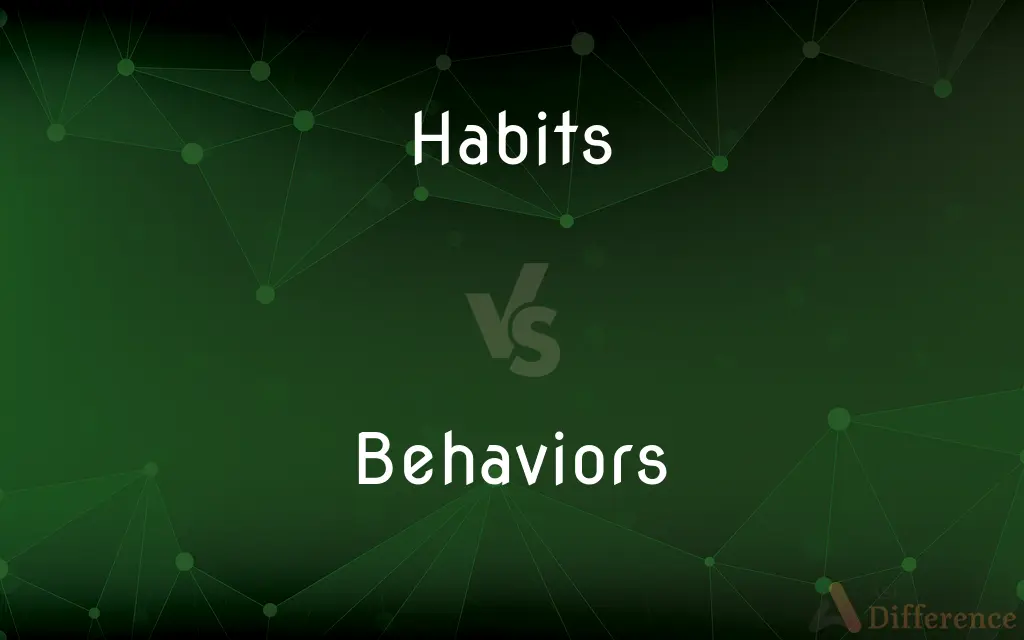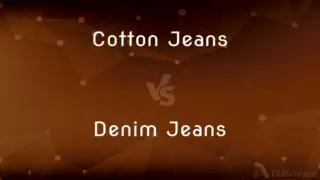Habits vs. Behaviors — What's the Difference?
By Fiza Rafique & Maham Liaqat — Published on August 31, 2024
Habits are repetitive actions performed unconsciously, driven by cues, while behaviors are broader actions or reactions to the environment, often conscious.

Difference Between Habits and Behaviors
Table of Contents
ADVERTISEMENT
Key Differences
Habits are actions or practices we perform automatically, often triggered by specific cues in our environment, such as brushing teeth after waking up. Behaviors, on the other hand, encompass a wider range of actions and reactions, both conscious and unconscious, in response to various stimuli, like smiling when happy or jumping when startled.
Habits form through repetition and are marked by a lack of deliberation. They become ingrained over time, making them challenging to change. Behaviors can be one-off actions or repeated actions, but they do not necessarily become automatic or performed without conscious thought.
Habits are a subset of behaviors, specifically those that are regularly performed and often automatic, but not all behaviors qualify as habits. For example, a spontaneous decision to try a new restaurant is a behavior, not a habit.
Understanding the difference between habits and behaviors is crucial for behavior modification. Changing a habit often requires altering the cues and rewards that drive it, while changing a behavior might need a different approach, such as motivation or cognitive restructuring.
Habits typically serve a purpose or fulfill a need, even if not immediately obvious, such as stress relief or social acceptance. Behaviors might not always have a clear purpose or might serve immediate, situational needs without forming a repetitive pattern.
ADVERTISEMENT
Comparison Chart
Nature
Automatic and unconscious
Can be conscious or unconscious
Trigger
Specific cues or contexts
Various stimuli, internal or external
Repetition
Regular and repetitive
Can be one-off or repetitive
Modification
Requires altering cues/rewards
May involve cognitive restructuring or motivation
Purpose/Need
Often fulfills a long-term need or purpose
Can serve immediate, situational needs or be purposeless
Compare with Definitions
Habits
Routine Actions
Checking your phone first thing in the morning has become a habit for many.
Behaviors
Observable Actions
His behavior during meetings is always professional.
Habits
Automatic Response
She has the habit of biting her nails when nervous.
Behaviors
Social Interactions
Their behavior at social events is friendly and open.
Habits
Learned Behavior
Driving the same route to work every day is a habit developed over time.
Behaviors
Reaction to Stimuli
The child’s behavior changes when he is hungry.
Habits
Subconscious Activity
Automatically putting on a seatbelt when entering a car is a safety habit.
Behaviors
Conscious Choices
Choosing to volunteer on weekends is a deliberate behavior.
Habits
Repetitive Practice
Practicing piano daily at the same time is a habit for some musicians.
Behaviors
Adaptive Responses
Adapting behavior based on feedback is crucial for personal growth.
Habits
A recurrent, often unconscious pattern of behavior that is acquired through frequent repetition
Made a habit of going to bed early.
Behaviors
The manner in which one acts or behaves.
Habits
An established disposition of the mind or character
A pessimistic habit.
Behaviors
The actions or reactions of a person or animal in response to external or internal stimuli.
Habits
Customary manner or practice
An early riser by habit.
Behaviors
Plural of behavior
Habits
Plural of habit
Common Curiosities
Are all habits bad?
No, habits can be either beneficial (e.g., exercising regularly) or detrimental (e.g., smoking).
What is the main difference between habits and behaviors?
Habits are automatic actions triggered by cues, whereas behaviors are broader actions or reactions that can be either conscious or unconscious.
Can a behavior become a habit?
Yes, through repetition and association with specific cues, a behavior can become a habit.
Is a reflex a habit or a behavior?
A reflex is a type of involuntary behavior, not a habit, as it is not learned or acquired through repetition.
Why are habits hard to break?
Habits are hard to break because they are automatic responses that occur without conscious thought, deeply ingrained through repetition.
What role does motivation play in changing behaviors?
Motivation is crucial for initiating and sustaining the effort required to change behaviors.
How can I change a bad habit?
Changing a bad habit often involves identifying and altering the cues and rewards that drive it.
Are habits conscious decisions?
Habits are not conscious decisions; they are actions performed automatically, often without awareness.
What is an example of a positive behavior?
Volunteering for community service is an example of a positive behavior.
Can behaviors be influenced by the environment?
Yes, behaviors can be significantly influenced by environmental factors and stimuli.
What is an example of a behavior that is not a habit?
A spontaneous decision to go for a hike on a new trail is a behavior that is not a habit.
Can changing the environment help in changing a habit?
Changing the environment can be effective in changing a habit by removing cues that trigger the habitual action.
Do habits serve a purpose?
Yes, habits often serve underlying purposes or fulfill needs, even if not immediately obvious.
How does repetition relate to habits?
Repetition is key to forming habits, as it reinforces the automatic response to specific cues.
How can understanding behaviors help in personal development?
Understanding behaviors can provide insights into one's actions and reactions, offering pathways for personal growth and improvement.
Share Your Discovery

Previous Comparison
Cotton Jeans vs. Denim Jeans
Next Comparison
Bean vs. LegumeAuthor Spotlight
Written by
Fiza RafiqueFiza Rafique is a skilled content writer at AskDifference.com, where she meticulously refines and enhances written pieces. Drawing from her vast editorial expertise, Fiza ensures clarity, accuracy, and precision in every article. Passionate about language, she continually seeks to elevate the quality of content for readers worldwide.
Co-written by
Maham Liaqat












































